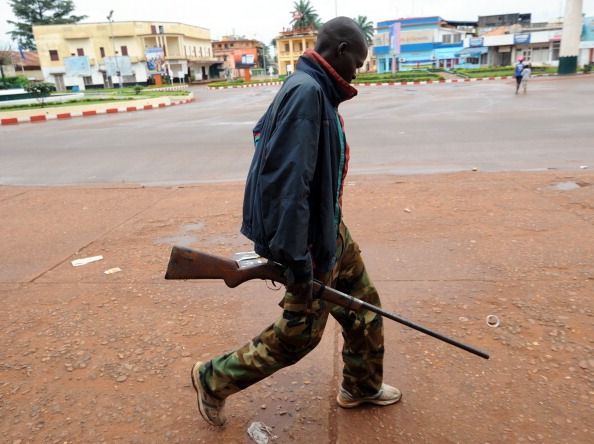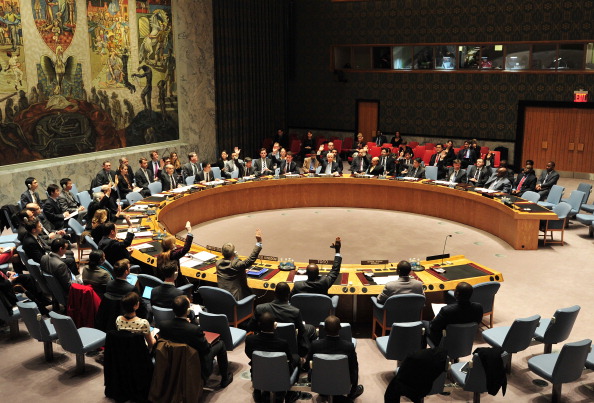
A man holds a rifle as he walks in a street of Bangui, Central African Republic (Photo Credit: Sia Kambou/AFP/Getty Images).
By Susanna Flood, Amnesty International’s Director of Media
On the surface, everything is quiet in Bangui, the tiny capital city of the Central African Republic. Strangely quiet. But behind this silence, stories of devastation are emerging. The city is calm, but people are afraid.
There are virtually no cars on the road and an eerie silence is hanging over the city. And then you hear a short burst of gunfire coming from one of the various quartiers which have been beset by fighting since early yesterday or French fighter jets do a sudden and unexpected fly-pass, making their presence in the city known.
There is no clear toll of those killed or wounded in the attacks between so-called anti-Balaka, said to be loyal to ousted President Bozizé, and the former Seleka forces of new President Djotodia. But those in the know say at least 200 have been killed, making it the largest death toll in one day since this crisis erupted.
It is women to whom the task of collecting the bodies has fallen. Only they can venture out.
It is women to whom the task of collecting the bodies has fallen. Only they can venture out. They are collecting corpses in wheelbarrows and, when brave enough, delivering them to hospitals or morgues. In some instances they are burying them in their back yards, not daring to venture further afield.
Insecurity also makes it hard for those in need of treatment to reach the hospitals. Likewise, the doctors who could be providing the emergency treatment are unable to leave their homes to help the wounded. The city has shut down.
The sense of insecurity is all-pervading. One human rights defender spoke to Amnesty International from what should have been the security of his own home. But even there he was afraid to be heard, whispering as he shared the latest news from his community.

The United Nations Security Council voted yesterday to approve a resolution giving French and African troops the go-ahead to restore peace in the Central African Republic (Photo Credit: Stan Honda/AFP/Getty Images).
Reports are also emerging of former Seleka patrolling some neighborhoods, opening fire indiscriminately, kicking down doors, pillaging and even killing. People are taking refuge in churches, ill-equipped to handle the security situation, let alone providing the necessary sanitation or food. Bangui airport is also said to be over-run by thousands of people seeking protection from the French forces protecting this strategic location.
But it is not just the Muslim former Seleka armed groups who pose a threat to security. As fighting broke out in Bangui, more than 50 bodies were brought to a mosque in PK5, one of the city’s Muslim neighborhoods.
This violence mirrors what has been happening the length and breadth of the country for many months. The silent crisis has finally reached Bangui, just as the U.N. Security Council, driven by France, is waking up to the looming catastrophe facing the besieged people of the Central African Republic.
While the world mourns the tragic death of Nelson Mandela, in this other corner of Africa people are suffering and in need of urgent action. This is not a time to forget these people. If anything, the legacy of Madiba should remind us of our duty to fight to protect those who are suffering.
The worse thing is the French has not positioned themselves where they can intervene. while the African forces and french are there…Seleka invaded km5 PK12, PK13 Boali road near a bar called Sandra and conducted door to doors killings of christian families….bodies are being rotten indoor now ! Genocide is happening right now!! At the moment the central Africans reject this salafiste president, and all the radicals from Sudan and Chad that brought him to power! Idris Deby of Chad and El bechir of Sudan destroyed our young democratic nation to put a radical djihadiste in power!! Idris deby did what Charles Taylor of Liberia did in Sierra Leone!! France is making the same mistake they made in Rwanda and the second genocide is happening before the eyes of the international community! I called FOMAC to interfere and save the lives of the family in PK13 Boali road on Sandra street the officer who picked up the phone after it rang more than 8 times said " Call later
'. Deby offer the his military service to France in Mali to silent the french government and destabilise Central African republic for a muslim or islamic republic? The president of France realised that i believe!